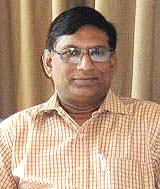 (Bihar Times) New Delhi, Feb 3 : How and when did life begin on earth? Did the first microorganisms arrive from space, riding piggyback on meteors that crashed into earth billions of years ago, or was life created from non-living chemicals? A researcher from Patna, Ashwini Kumar Lal has cast doubt on both the leading theories. (Bihar Times) New Delhi, Feb 3 : How and when did life begin on earth? Did the first microorganisms arrive from space, riding piggyback on meteors that crashed into earth billions of years ago, or was life created from non-living chemicals? A researcher from Patna, Ashwini Kumar Lal has cast doubt on both the leading theories.
Were the first seeds of life actually extraterrestrial 'spores', floating around in the infinite space on comets? This theory, known as Panspermia, was propounded by scientists to explain the origin of life on earth. They say the 'spores' took root in primitive earth more than four billion years ago after the earth was bombarded by meteors for around 700 million years.
However, Ashwini Kumar Lal says the theory of panspermia 'fails to address nagging uncertainties pertaining to the exact timing and location for commencement of the process of evolution of life on the primitive earth and elsewhere in the universe'.
Lal, who is deputy adviser in the Ministry of Statistics & Programme Implementation, has challenged another theory on the origin of life - known as abiogenesis - which says that life began from non-living chemicals.
In his article 'Origin of Life' in the October 2008 issue of Astrophysics & Space Science - a peer reviewed academic journal - Lal says: 'There is general consensus among biologists that bacterial cells cannot evolve from non-living chemicals in one step. It is speculated there must be some form of pre-cellular life.'
A favoured theory on the origin of pre-cellular life is that during the early stages of evolution of life molecules of RNA or ribonucleic acid replicated itself, forming the base for the evolution of DNA or Deoxyribonucleic acid, which contains the genetic instructions of all living organisms.
However, Lal says that experiments conducted by scientists in laboratories worldwide 'have not found the RNA in isolation to be self-replicating'.
'When there was no life on earth, 2.3 billion years ago, and there was no oxygen, the situation was entirely different. What jumpstarted life? Scientists conceptualised the RNA world, (of self-replicating RNA), which has attributes of protein,' Lal pointed out.
But, he said, 'experiments have failed to provide conclusive proof to support the RNA World theory, despite biotechnology tools. Scientists have not been successful in proving in the laboratory that inorganic compounds can become organic,' Lal told IANS.
Another flaw in the theory is that scientists have failed to answer how the RNA compounds came into being on the earth in the first place, Lal said.
In his paper, Lal has mentioned the existence of 'extremophiles', which are usually unicellular microbes that can survive in the harshest of environments on earth. 'Such microorganisms thrive in extreme cold, extreme heat, extreme acidic, and extreme alkaline conditions. Some thermophiles have been found to flourish at a depth of 2.8 km in gold mines in South Africa, while methane-oxidising microbes have been reported to be thriving at a record depth of 1.62 km beneath the Atlantic seabed at simmering temperature of 60-100 degree Celsius,' he writes in the paper.
'Given the potential of extremophiles to survive in highly inhospitable environments on earth, the possibility of life on extraterrestrial bodies like Mars, Europa, Ganymede, Enceladus, Titan, in the solar system cannot be ruled out. Keeping in view the great survival instinct of extremophiles on earth, the possibility of traces of life being found on billions of unexplored planetary bodies outside our solar system cannot be negated either.'
He concludes by saying that 'the DNA mechanism is a common thread of all modern organisms, plants, animals, all living things.
'The fact that all organisms share the same DNA-based mechanism for genetic transmission suggests that life emerged on earth only once during the planet's entire history but the timing remains unknown.
Lal, who studied over 60 relevant research papers in the fields of genetics, astrobiology and space science, has concluded that science has no clue about how life began.
comments...
|